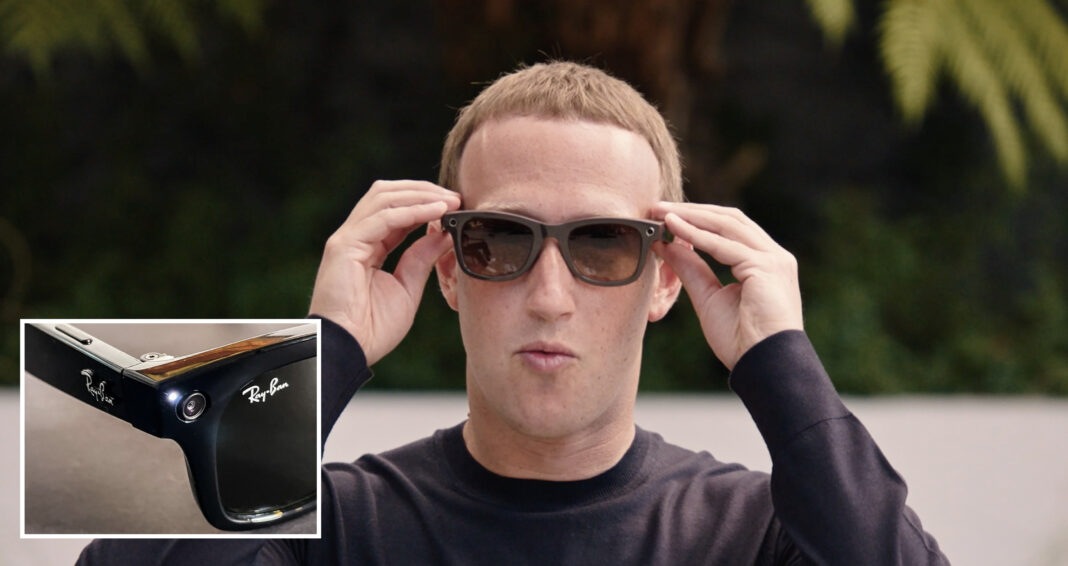MENLO PARK: Social giant Facebook Thursday rolled out the first generation of its smart glasses named ‘Ray-Ban Stories’ with 20 different style combinations that offer music, and are capable of take calls or capture photos and short clips besides sharing them on Facebook’s services using a companion application.
The American multinational technology giant partnered up with Italian luxury sunglasses brand Ray-Ban while the product, which will cost you $299, is said to be a new way to ‘share your adventures’ and a privilege to ‘stay present with friends, family, and the world around you.’
The latest gadget comes with a pair of cameras, a microphone and speaker to listen to podcasts, and a voice assistant for a hands-free experience.
The shades weigh less than 50 grams and come with a leather hardshell charging case whereas the battery is reportedly capable to run it for the full day.
Rayban Stories users have to pair the glasses with the Facebook View app. These will also support the Facebook Assistant so users can give commands to carry out the task. The glasses can pair with iOS and Android devices however the assistant is currently available for English only.
Soon after the launch, Facebook draws criticism from tech critiques who claim that RayBan stories share a heavy resemblance to Snapchat’s Spectacles, which are now in their third generation.
The criticism is not new for Facebook as the tech company established by Zuckerberg has been heavily inspired by many of the other smaller companies that roll out never-seen features.
Facebook launched its first smart glasses in partnership with Ray-Ban maker EssilorLuxottica that allow wearers to listen to music, take calls or capture photos and short videos https://t.co/Agwg9wnClb 🕶️ pic.twitter.com/VgZVVVDM71
— Reuters (@Reuters) September 10, 2021
Facebook, which has been criticized for its handling of user data, said it would not access the media used by its smart-glasses customers without their consent.
Furthermore, the company also said not to use the photos or videos captured using the glasses and stored in the Facebook View app for personalizing ads, and said the glasses would be an ‘ads-free experience’.
Meanwhile, the camera in the waferers also raises security and privacy concerns while Facebook claims on its website that the glasses were ‘designed with privacy in mind’. The tech giant created an entire micro-site dedicated to the privacy guidelines of Rayban Stories.
The 5MP cameras at the shades come with LED light around the edge. The white LED light turns on to let others know you are recording them.
The social giant has shown progress in growing its product base over time, starting with Oculus Quest and Oculus Go headsets which were not so successful in getting expected users. The virtual reality gadgets eventually paved the way for the Oculus Quest, which Zuckerberg has said is now outperforming expectations.
Meanwhile, the first-generation smart glasses are now available in the United States, Australia, Canada, Ireland, Italy, and the UK.
The reported revenue of Facebook is around $86 billion last year, while most of the funds were garnered from advertising but the firm has invested heavily in virtual and augmented reality, developing hardware to support augmented reality glasses.
The firm has indicated that the device is a stepping stone for its Augmented Reality ambitions and an effort to get users acquainted with the idea of high-tech glasses.
A statement from CEO Mark Zuckerberg cited “Ray-Ban Stories are an important step toward a future when phones are no longer a central part of our lives and you won’t have to choose between interacting with a device and interacting with the world around you”.
“We’ve believed for a long time that glasses are going to be an important part of building the next computing platform” he added.
Let it be known that the chief scientist of Facebook last year said the company was five to 10 years away from being able to bring to market ‘true’ AR glasses, which would superimpose virtual objects onto the wearer’s view of the real world.
Meanwhile, a number of tech firms including Alphabet Inc’s Google, Microsoft Corp, Apple Inc., and Snap Inc. have raced to develop various smart glasses products, but early offerings like Google Glass proved difficult to sell to consumers put off by high price points and design issues.
Facebook suspends Ashraf Ghani’s account following his post on Afghan crisis


